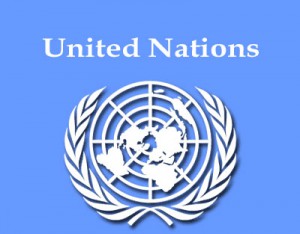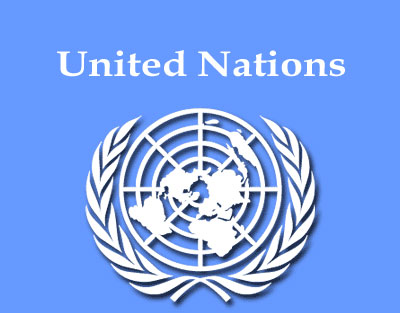 UNITED NATIONS – There are voices from Northwestern Ontario in New York at the UN Headquarters. A delegation from NAN is attending the meetings. The annual United Nations forum aimed at advancing the rights of the estimated 370 million indigenous persons around the world opened today with a call to turn those rights into a practical reality.
UNITED NATIONS – There are voices from Northwestern Ontario in New York at the UN Headquarters. A delegation from NAN is attending the meetings. The annual United Nations forum aimed at advancing the rights of the estimated 370 million indigenous persons around the world opened today with a call to turn those rights into a practical reality.
More than 1,300 delegates are expected to participate in the two-week Permanent Forum on Indigenous Issues, which is being held at UN Headquarters in New York and is marking its tenth anniversary. This year the forum will focus on reviewing progress made on issues ranging from economic and social development to the environment and whether indigenous peoples have given free, prior and informed consent to decisions affecting their communities.
Opening the forum, Secretary-General Ban Ki-moon said the UN Declaration on the Rights of Indigenous Peoples – adopted by the General Assembly in September 2007 – finally had the consensus support that it deserved. “Now we need to make the declaration’s principles a reality,” he said, stressing that protecting and promoting the rights of indigenous peoples benefited everyone, and not only those groups. Ban urged participants to “raise your voices” during the forum so that the world can hear about the threats and risks that indigenous communities face, as well as the unique expertise that they can bring to issues such as climate change.
“This forum can play a dynamic role in… helping indigenous peoples around the world achieve the self-determination they deserve. Your success can build momentum toward the World Conference in Indigenous Peoples planned for 2014. You can identify ways to bring to life the principles enshrined in the declaration.”
Here is the text of the Secretary-General’s remarks opening the Conference:
Thank you Doctor Myrna Cunningham Chairperson,
Under-Secretary-General Sha Zukang,
Distinguished members of the Permanent Forum on Indigenous Issues,
Excellencies,
Indigenous elders,
Ladies and gentlemen,
It is a great pleasure for me to be here with you today. I am happy to open this tenth session of the Permanent Forum on Indigenous Issues. At the onset, Madame Chair, I would like to congratulate you on your election as the chair of the tenth PFII and under your leadership I hope that well beings and rights of indigenous peoples will be fully guaranteed. And as Secretary-General, you can count on me.
Ladies and Gentlemen,
A warm welcome to all the indigenous representatives from around the world. You have traveled long distances, physically but also in the struggle to achieve your rights.
Welcome also to the new members of the Forum. I look forward to working closely with you.
This is the Forum’s tenth anniversary.
Ten years of fighting against decades of marginalization.
Ten years of uniting different cultures to reach shared goals.
Ten years of pushing for indigenous rights.
The road has been tough, but the rewards are real.
The United Nations Declaration on the Rights of Indigenous Peoples finally has the consensus it deserves.
Now we need to make the Declaration’s principles a reality.
To those who do not grasp the Declaration’s importance, I say: protecting and promoting the rights of indigenous peoples benefits us all.
We see examples around the world.
In Peru, indigenous communities are responding to climate change by re-introducing native varieties of potatoes. They have support from a United Nations-backed fund benefiting poor farmers. Now they are helping conserve the earth’s biodiversity.
We know that indigenous peoples have a close spiritual relationship with nature. Now we have to make the connection between their knowledge – your knowledge – and our world.
Indigenous peoples have been living in a “green economy” for centuries. When economists today look for new ways to achieve sustainable development, they should look at old practices in indigenous communities.
Ancient indigenous traditions can help overcome modern problems.
The goal is not to appropriate your knowledge, to extract it or exploit it, but to respect indigenous peoples and help preserve their traditions.
There is an indigenous saying that, “When an elder dies, it is like a light burning out.”
This is a beautiful expression of respect for the wisdom of age.
But it could also be a warning. We could just as easily say that, “When an indigenous custom dies, it is like a light burning out.”
If that is true, our world is growing darker.
Today, one indigenous language dies every two weeks.
Indigenous cultures are threatened with extinction.
Millions of indigenous peoples continue to lose their lands, their rights and their resources. They make up one-third of the world’s one billion rural poor. And they are among the most vulnerable and marginalized of any group.
Indigenous women, who are the custodians of so much rich heritage, often suffer the most.
We do not have enough studies of the problems, but the studies we do have show appalling gaps.
Indigenous peoples do not live as long as others. They suffer higher rates of diseases like diabetes and tuberculosis. Their children are less likely to survive past the age of five. Their communities are less likely to thrive.
This Forum can play a dynamic role in changing this deplorable situation and helping indigenous peoples around the world achieve the self-determination they deserve.
Your success can build momentum toward the World Conference on Indigenous Peoples planned for 2014. You can identify ways to bring to life the principles enshrined in the Declaration.
And you can shape other important events on the international agenda.
Two decades ago in Rio, indigenous peoples were active at the United Nations Conference on the Environment and Development. Maybe some of you were there. We need you now even more with the Rio+20 Conference coming up next year.
From the forests to the oceans, from the mountains to the deserts, around our world you are guardians of nature. We need you to help influence the decisions we make today on energy and the environment, decisions which will affect generations to come.
Ladies and gentlemen, Earlier this year in Guatemala, I met with Rigoberta Menchu. I remember when she won the Nobel Prize in 1992. Just before they made the announcement, people kept asking her, “What if you win? What if you lose?” Here was her answer. She said, “With the Nobel Prize, there are no losers or winners. There is a chance to hear about the struggle of people who are oppressed, a chance to be heard, and we hope that this chance never ends.”
We must end the oppression, and we must ensure that indigenous peoples are always heard. Raise your voices here at this Forum and beyond. I will urge the world to listen to your voices.
Thank you very much.

